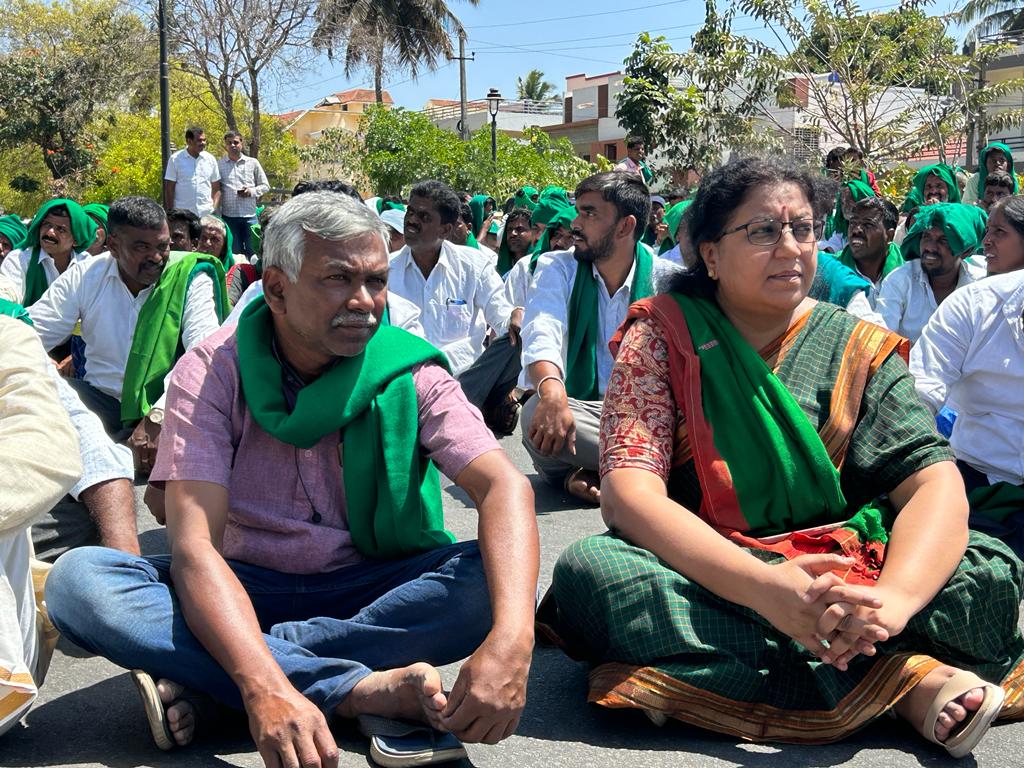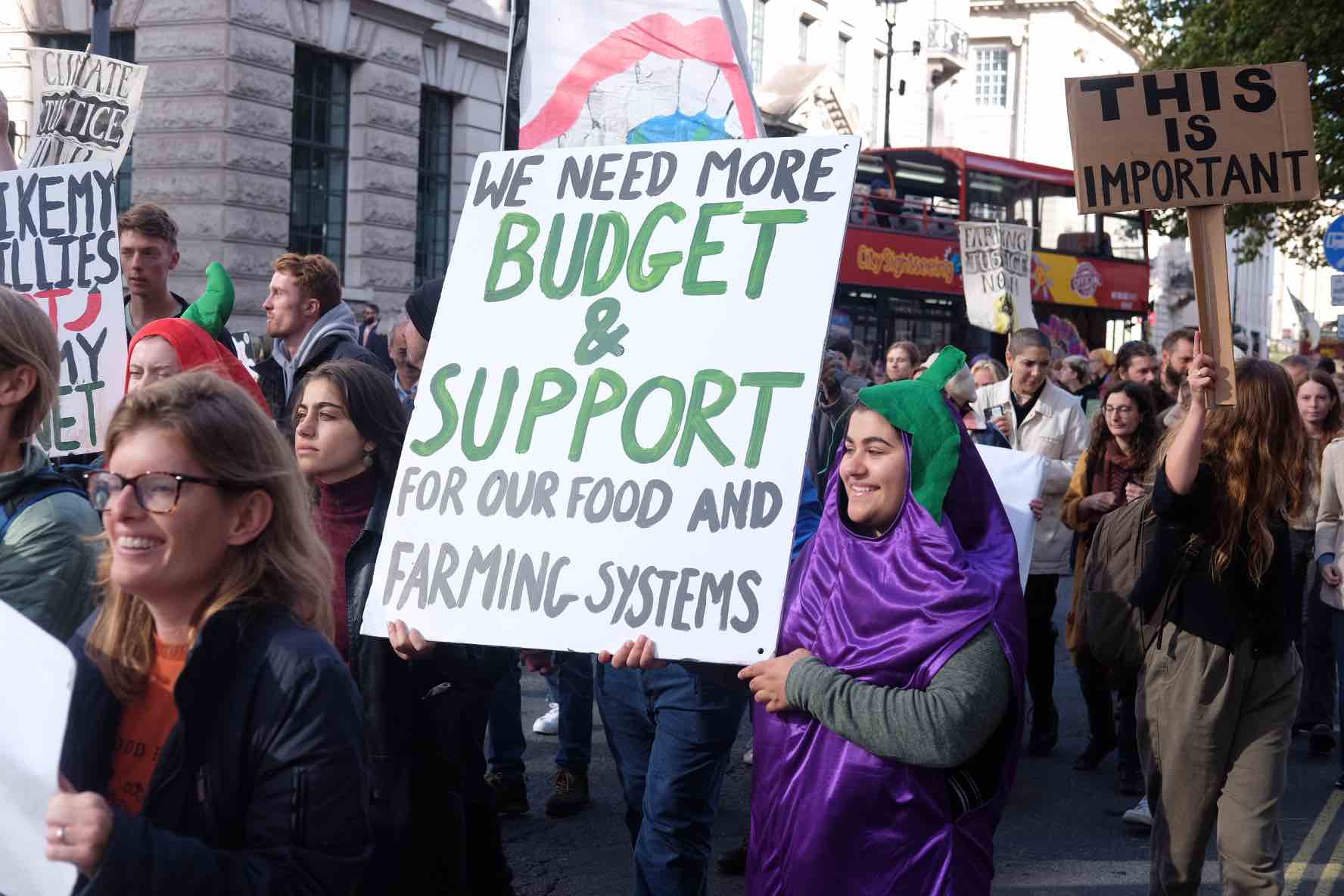by Jyoti Fernandes
Tuesday 5th Feb 2024
After decades of being undervalued by governments and exploited by corporate supply chains, farmers have reached a crisis point.
In recent weeks farmer protests have erupted across the world; from tractor rallies in France, to road blockades in Delhi, and direct action here in the UK too. Farmers are taking to the streets to defend their livelihoods and the bedrock of the food system we all depend on.
I’m in India right now joining the protests organised by the Karnataka Farmers Movement (KRRS) who represent 10 million peasant farmers across India’s southern Karnataka State. KRRS was formed in the 90’s to challenge the World Trade Organisation and the power it gave to transnational corporations in dictating how farmers produced their food, to what standards, and who they sold it to.
The KRRS recognised early on how important it was to protect small farms and local food economies by making sure governments regulate markets and limit corporate power over our food system. Now, as we face the intersecting challenges of climate change, rampant neoliberalism, and global inequality, we must learn from farmers movements like the KRRS and demand that governments put food and farming firmly on the political agenda.



Across the globe, the drive for liberalising our food systems so that countries can pursue “free trade” has meant that governments have stripped away regulations and mechanisms needed to protect farmers rights and livelihoods. This neoliberal approach to the food system has encouraged cheaper imports which undercut the prices of farmers at home, has forced farmers to produce cash crops for export, and has removed important mechanisms for protecting their rights- from a guaranteed fair price ( in India this is called the minimum support price), to their right to save seed to their right to protect land from foreign investors.
Thanks to campaigns led by environmental and peasant movements across the world, it is now widely accepted that the industrial farming model is decimating biodiversity, destroying our soils, polluting our water and contributing to climate chaos.
Across the globe the climate emergency is already impacting farmers drastically – ruining harvests, disrupting supply chains and destroying farms and homes. Not only do farmers and peasants need support to adapt to these changing climates, but conventional farmers also need support to transition to more climate-friendly farming practices that will reduce emissions, store carbon and lessen dependance in fossil fuel inputs.
It is increasingly urgent that governments lead the way in supporting a transition to more environmental farming. But after years of being forced down a path of intensification and chemical inputs, farmers are now being told to bear the cost of shifting their production back to more environmentally friendly farming methods.
Here in the UK many farmers have expressed deep concerns that new environmental farming subsidy schemes will cause a significant drop in their income, and could push some farming businesses over the edge. Indeed many of the farmers who have taken to the streets across Europe have demanded the removal of new pieces of environmental legislation in fear that they will compromise national food security and farm viability.
While I fundamentally and unequivocally believe that a global transition to agroecology is needed, I can also sympathise with farmers who feel they are being left behind by the implementation of policies that have no regard for the need for a just transition; one which supports both nature a farmers.
Many governments, the UK government included, are implementing environmental legislation without the necessary budgets, advice and logistical support that farmers require to embark on the transition.
All governments have a responsibility to uphold the Right to Food. It is basic common sense that safeguarding the domestic food supply and food sovereignty of a population is the responsibility of the state.
Now more than ever we need ambitious government support packages, robust regulations and strict trade rules which will ensure farmers are properly supported in the agricultural transition and can receive a fair price for their produce.
This is why in the run up to the General Election the Landworkers’ Alliance will be calling for:
- A bigger agriculture budget which is able to provide the financial support and reassurance urgently needed to help farmers to transition to more sustainable farming.
- Regulations which make sure buyers, like supermarkets, pay fair prices and public procurement policies which create a strong domestic market for UK produce.
- An ambitious New Entrant Support Scheme to inspire, train and support a new generation of farmers and landworkers onto the land.
- Trade rules which put a tariffs on products which be produced in the UK and stop the importation of low standard products, so that farmers get a decent price.
A just transition to a more environmentally friendly food and farming is both necessary a possible. Environmental policies need not, and must not, come at the expense of farmers’ livelihoods. We will need both to secure the future of our food system.

